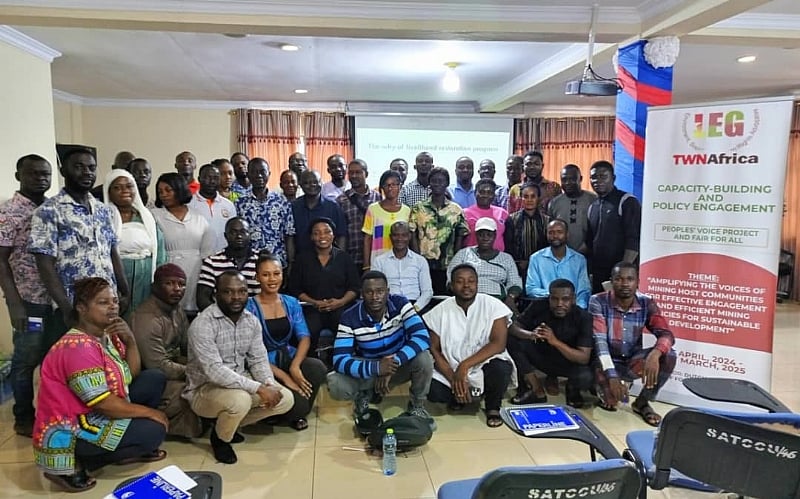A recent workshop focused on mining-induced resettlement and negotiation skills was held in Sunyani for communities affected by mining activities in Newmont’s Ahafo South and North areas. Organized by Livelihood and Environment Ghana (LEG) with the Dutch Ministry of Foreign Affairs funding, the training aimed to enhance the capabilities of members of the Ahafo Resettlement Negotiation Committee (RNC). The goal was to equip them with legal knowledge and improved negotiation skills, enabling them to engage more effectively with Newmont and secure better resettlement packages for the farmers they represent. Participants included RNC members, affected community members, farmers, and youth from various affected communities like Apensu and Dokyikrom.
Dr. Samuel Kumi, an Environmental Scientist and Resource Governance Expert, addressed the workshop attendees, highlighting the dual nature of mining activities. While mining can provide socioeconomic boosts such as revenue and job creation, it also brings substantial costs to the communities affected, especially regarding forced resettlements. Understanding the implications of mining-induced resettlement is crucial for the survival and sustainability of rural households, where 80% of their livelihoods often rely on local ecosystem services that can be disrupted by mining operations. Dr. Kumi emphasized that the challenge lies not only in the physical displacement but also in the emotional turmoil and loss of identity that resettlement can cause, particularly in impoverished communities where resources are already scarce.
The potential socio-economic repercussions of mining include increased poverty rates, diminished access to vital services like education and healthcare, and a degradation of cultural identity. Dr. Kumi elaborated on the complex social costs tied to mining engagements, which can lead to disrupted family relationships, social isolation, loss of community ties, and a general decline in both mental and physical wellbeing. He underscored that successful negotiations between mining companies and affected households are imperative for mitigating these negative impacts and fostering a harmonious transition during resettlement.
Richard Adjei-Poku, Executive Director of LEG, further expanded on the broader advocacy work undertaken by his organization in the sphere of mineral governance and policy reform. Despite Ghana’s status as the ninth-largest gold producer globally, Adjei-Poku pointed out that the economic benefits accrued from mining are not equitably distributed. A disproportionately small percentage (5%) of the gross income generated from gold production contributes to the Ghanaian state, while foreign mining companies claim the vast majority. He criticized the high operational costs reported by these companies that enable them to evade significant taxation, suggesting that much of the financial advantage flows out of the country, leaving local populations with inadequate compensation and substandard housing arrangements during resettlements.
As part of LEG’s ongoing efforts to empower marginalized groups, particularly women, Adjei-Poku noted that the organization has been actively supporting income-generating initiatives for the past nine years. This partnership with TWEDA and the Sunyani Area Teachers Credit Union aims to uplift communities affected by mining through financial support and capacity-building programs. In the current year, GHS 400,000 has been allocated to assist selected women in Ahafo in enhancing their livelihoods, demonstrating a commitment to long-term economic empowerment amid the challenges posed by the mining sector.
Overall, the workshop served as a vital platform for community members to gain insight into the complexities surrounding mining-induced resettlements. By strengthening negotiation skills and providing legal knowledge, the training offers a path toward fairer treatment for affected households. However, the ongoing challenges highlighted by participants, including economic inequality and inadequate compensation mechanisms, illustrate a pressing need for systemic changes in Ghana’s mining policies. The collaborative efforts of organizations like LEG demonstrate a concerted approach in advocating for better governance in the mining sector, ultimately aiming to balance the benefits of mining with the rights and welfare of local communities. With continued dialogue and engagement, affected communities in Ahafo may navigate the difficult waters of mining-induced resettlement with improved confidence and legal backing.














